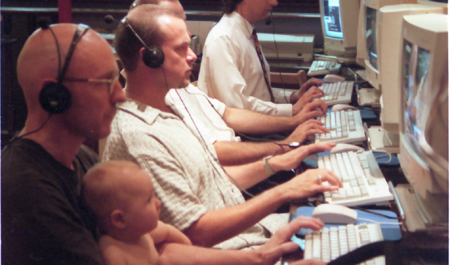From the Kitchen #32
The other night a group of us played strip dinner in Box Hill. It’s like strip poker with the cards replaced by very spicy Szechuan (Chinese) food. For each course, the first person to call barley has to take an item of clothing off. As it was already a hot night, no-one had much on to start with, so each of us was determined to persevere for as long as possible.
I need to explain, perhaps, that Szechuan food can be impossibly spicy. When the first dish arrived (a huge bowl of pieces of white fish floating in yellow oil) the smell alone seared the nose. Ah, I thought, those green beans will help me cope with this. How innocent I was. Those red speckles should have warned me. The others mopped their brows as I removed one of my shoes.
One down, five to go.
I fared no better with the crispy chicken on noodles accompanied by bitter melon. I felt silly, sitting there with one bare foot and one socked. By the time the bill arrived, I was bare-chested and still sweating.
One friend suggested that next time we go to a Szechuan restaurant in Toorak. He explained that it would make the Box Hill place seem mild. I suggested that we could wait for a cold night in winter – jumper and coat weather.
We used to play strip trivia when I was at university. I was good at general knowledge but useless with popular music and sport. There was lots of cheating but no-one minded. It was an excuse for all of us to get naked together. This was the late ’60s after all.
I used to play all sorts of private games when I was young. On family outings, sitting in the back seat, I would control the car’s speed and direction with the window winder. It was a fabulous game because it put me in control.
Many of us would like to be able to control the world, or at least control our immediate environment. Few of us have the power to do so. Even the Prime Ministers and Presidents we elect seem to be hamstrung by compromises imposed by others.
How do we deal with that perceived powerlessness? Some, unfortunately, take it out on others, through violence, or emotional and physical abuse, or through playing the role of victim.
People easily forget that there is also power to be wielded in the collective. I am old enough to have been involved in the Vietnam moratoriums, when hundreds of thousands of people marched to end Australia’s involvement in the Vietnam War. Later, there was a national, public movement to stop the Tasmanian government damming the Franklin River. Both campaigns were successful. The current, growing public disquiet about the lack of real and urgent action by governments on environmental issues could grow into a similar force.
When I was at university, students enjoyed pranks. They varied from the very funny and harmless to the not so funny and less harmless. A harmless, though not belly-laughingly funny one I remember was the attachment of a student political flag to the radio aerial on the supposedly secure roof of Melbourne police headquarters. A funny, though perhaps not completely harmless prank involved students telling a gang of road workers that other students dressed as police officers were on their way to tell them to stop working; they then phoned the police to report that a bunch of students had stolen equipment and were digging up a road. They stood back and watched. These days the whole exercise would have been broadcast on the internet.
Some people give themselves the semblance of power by playing electronic games. Many of these games are fanciful but there is a growing number which aim to represent the real world. I hope that, in the long-term, this doesn’t lead to a reduction in the ability of people to take part in the world outside those games.
I’m waiting for someone to develop a game, to be played interactively over the internet, to evolve solutions to the world’s problems. It could allow scenarios to be played out and consequences tested. It would use cutting edge modelling in the areas of ecology, economy, environment, sociology, health, population, industry, primary production, mining and all the other interacting factors that are influenced by human behaviour and which in turn influence it.
That would be a game worth playing.
© 2009 Daan Spijer
[to receive an email each time a new piece is posted, email me: <daan dot spijer at gmail dot com>]
 CLICK HERE to download a formatted PDF of the above post
CLICK HERE to download a formatted PDF of the above post
 See more of Daan Spijer’s writing and his photos at Seventh House Communications
See more of Daan Spijer’s writing and his photos at Seventh House Communications

